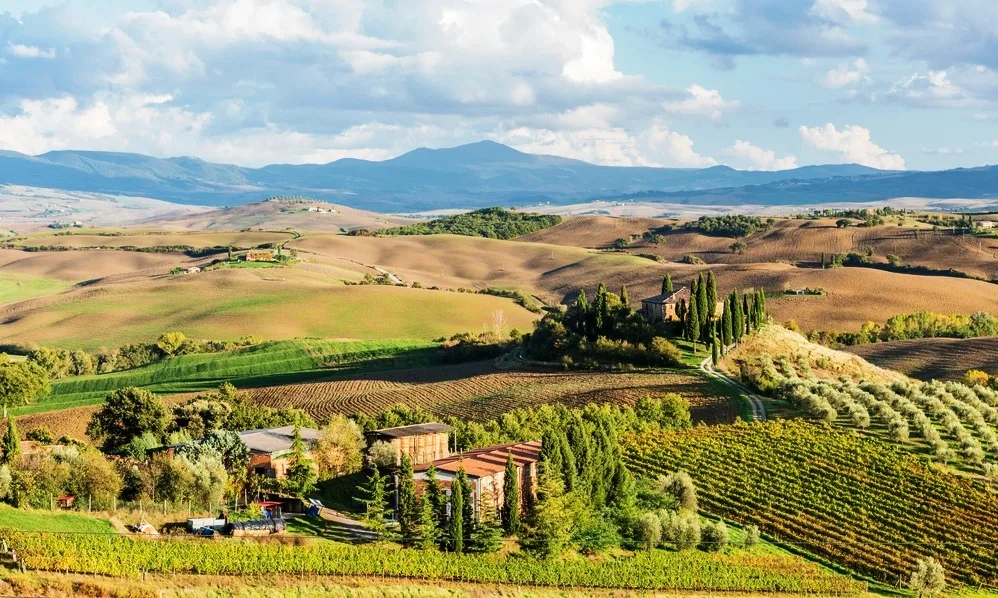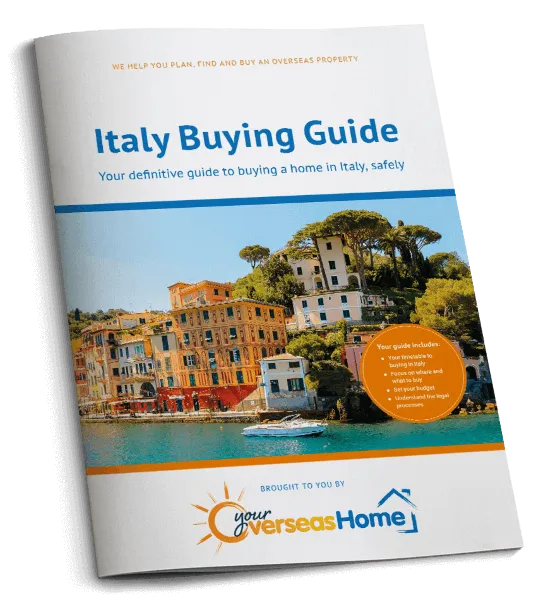Farm holidays in Italy are popular all year round and offer an authentic Italian experience. They also offer the possibility of an income for entrepreneurs with rural ambitions.
Find homes in Italy via our property portal.
The British have been entranced by the Italian countryside for centuries – remember the scene in A Room With A View when Lucy Honeychurch falls in love in a field of violets in Tuscany? Suppose you could both live there and make a living from it? If that sounds like paradise, you need to think about “agritourism”, where a working farm offers holiday accommodation.
You can find farms that offer cooking classes, where you can learn how to cook classic Italian cuisine.
What is agritourism?
In layman’s terms it is where holidays are offered on a working farm to generate additional income. The types of farms can vary, but most are set in gorgeous scenery of olive groves, vineyards, orchards, or even fields of violets. Guest rooms are usually found in the farm house, or converted farm buildings close by.
In 2015 a survey from Istat.it found that 22,238 farms have been registered to provide accommodation, an increase of 2.3 percent on the previous year. More than 1,600 new farms were licensed as rural tourism businesses last year. With well over 4,000 properties, Tuscany has a long tradition of offering agritourism breaks, as does the province of Bolzano in the north with over 3,000 farms.

Rooms with views of the Italian countryside. DiegoMariottini / Shutterstock.com
With the men often working the traditional farming operation, one in three such businesses are managed by the female members of the family. Traditional Italian cooking is often part of the charm, especially if using eggs, vegetables, meat, cheese, wine and olive oil from the farm. You can even find farms that offer cooking classes, where you can learn how to cook classic Italian cuisine.
Visitors may be invited to experience life working on the farm, by helping to pick grapes, olives, fruit and vegetables, or collect the eggs from the chickens. Your host may also organise tastings of typical products local to the area, such as cheese and wine.
Other activities on offer
Over 10,000 farms offer extra activities, often linked to the territory in which they are located; giving tourists an authentic Italian experience, while enhancing the cultural heritage of the region. You may be introduced to local music, art, traditions and festivals; as well being offered outdoor activities such as cycling, horse riding, hiking, quad biking and painting – allowing you to fully enjoy your rural surroundings.
Holidays in Italian farms are particularly popular with families wanting to enjoy the outdoors together, far from the stresses of home
Rural holidays are particularly popular with families wanting to enjoy the outdoors together, away from the stresses of life back home – swapping schools and offices for nature. Even on an off-season autumn break you can go on walks and bicycle rides together; looking for mushrooms, autumn leaves, pine cones and chestnuts.
Most people hire a car and explore the local villages, markets and food fairs, such as the International Fair of White Truffles in Alba – 8th October to 27th November – which attracts thousands of tourists from Italy and abroad every year.
Starting an agritourism business
To be registered as an agritourism farm you need to demonstrate that you are a farmer cultivating the land, conducting forestry or animal husbandry. The next steps require you to obtain authorisation from the local city authorities – the procedures and documents can vary from region to region.
If you are planning to buy an Italian farm in Tuscany, Umbria or Veneto it won’t simply do to purchase any old farm.
Much like the UK you are also required to complete a number of standard procedures prior to establishing a tourism operation: such as registering for VAT, opening a Tax account, registering with the Chamber of Commerce as a rural tourism operator, obtaining permission from the mayor to install road signs, receive approval from the fire department, adhering to health and safety legislation, payment of waste tax and seeking membership of a trade association.
If you are planning to buy an Italian farm in Tuscany, Umbria or Veneto it won’t simply do to purchase any old farm. You will need to conduct extensive research and find a property with “agritourism potential” that will generate an income. Consider whether a property has the character and features that tourists love and a location that offers activities such as walking and cycling trails, national parks, wineries, pretty villages, restaurants and markets.
Finally, checkout how many agritourism farms are in the area and what they are offer by visiting them. Don’t forget to find out how full their rental calendars are.
Once you have found a property that ticks all the boxes, you could be set for a rewarding outdoors lifestyle that you can share with your enthusiastic guests.











